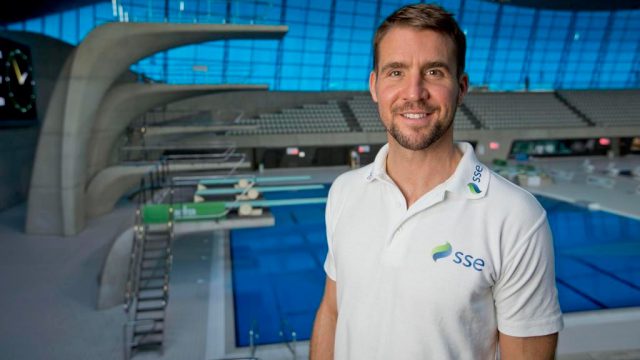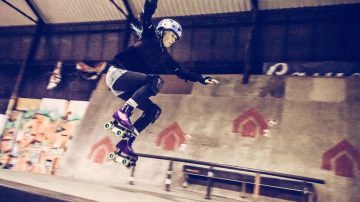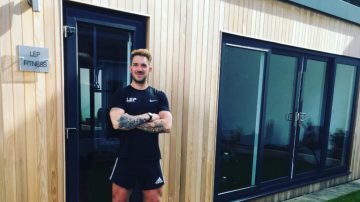I was asked to interview Leon Taylor for Sheffield Flourish. Leon describes himself as having been a ‘problem child’ and has more recently been exploring physical activity as a way to manage his ‘condition’.
I had watched his Ted Talk and I was really interested in speaking to him. As someone with mental illness I myself have just started working with a personal trainer to aid my weight loss and wellbeing so I was eager to find out more about the benefits of movement upon the mind from Leon. He began by telling me about a therapeutic activity that he had planned for the upcoming weekend:
“I’ll be going for a swim in the sea in Brighton and that’s for my health and wellbeing. I’ve been getting used to the cold water over the last few months and weeks. I’ve been doing a bit of research into the benefits of cold water exposure; I must say it makes a hell of a difference to my immune system and my mental wellbeing as well. I was going in feeling a bit sorry for myself and coming out after freezing for three minutes feeling much more like taking on whatever challenges are ahead.”
I asked him if he could share his story with me. He told me this –
“For whatever reason I wouldn’t sleep, right from the get-go. I needed constant attention and as I got older I wouldn’t play with my toys on my own, I’d need to be constantly engaged with. This was very challenging for my parents and they found that the only way to engage me was through movement; whether that was bouncing in a baby bouncer or being driven around in the car in a baby seat around and around or doing different activities. They went to the family doctor, as I said in the Ted talk, to see if there was anything he could do and he said if my parents were tired, which they clearly were, they could sedate me – this was in the late ‘70s. Ritalin, which was a very common ADHD drug was available, although I was never given that label.
“My Mum and Dad decided that they didn’t want to put me on medication, so they decided to use physical movement as my medicine. They took me swimming and to gymnastics and as I got older I tried every sport that was available in my local area. That was the best move my parents could have made. I was completely engaged when I was doing physical activity that I enjoyed, I was easier to manage. I would sleep, I would rest, I would behave. I was still very challenging at school where the instruction from the teacher was ‘sit still, concentrate, and be quiet,’ and I couldn’t do any of those, especially when I was young. I was designed to run and run and run and mess around and so I was always in trouble at school. Sport was my saviour; I really excelled in a setting where I could physically move and challenge myself so I was able to navigate through. As I got older I was able to manage my energy myself because of the love I had for all of the physical activities I was involved with.”
I asked Leon if he’s ever received a diagnosis for the issues he faced.
“No, this is the interesting thing. This was the only time I saw a medical professional specifically about my hyperactivity/ADHD/problem child-ness; when I was 1 or 2. Who knows whether I have self-managed a disorder.”
Leon mentions in his Ted talk about a time when he wasn’t enjoying his training/physical activity – I asked him to tell me more about this.
“I fell into a depression; at the time it was all-consuming and led to a very, very low place. It was a series of hits; to my wellbeing physically and mentally and emotionally. My whole life was about my sport and I had reconstructive shoulder surgery. I was in a cycle where life wasn’t fair and ‘why was it happening to me?’ and I went to a very dark place where lots of people tried to help me and I was shutting them out and it was a desperate time for me.
“When I look back at it I was doing lots of things that weren’t helping; I wasn’t talking to anyone, I was walking around with the weight of the world on my shoulders, I was ruminating, I was constantly carrying tension, I was never smiling. Even though I was moving/training, I wasn’t training with any enjoyment. There was no intention behind the movement; I was just going through the motions and taking it all too seriously.
“My point is that it’s not just movement; people at this time of year force themselves to run or go to the gym but maybe those movements aren’t the movements for them. Maybe they should go to a dance class or go for a walk or try yoga. Physical movement changes your emotional state; it biochemically changes what’s happening in your brain, but if you’re not enjoying it – as in, you’re there but you don’t want to be there – then it actually doesn’t have the same effect. I learnt that by going through the lowest point in my life and in my career where I just couldn’t snap out of it, I couldn’t find a way to be positive. I was in a very, very dark place and I feel very fortunate that I was able to turn it around and eventually come through that stronger with more awareness and have the ability to empathise with others and encourage them in that positive way.”
So how did you change your approach to the training, I asked Leon.
“I hit rock bottom and a friend and mentor very gently put their hand on my shoulder, and I remember the moment so clearly. They just asked me ‘why do you do this sport?’ and at that time I was stood on the poolside in floods of tears with my shoulders hunched and I said through gritted teeth ‘because I enjoy it.’ So he asked why he hadn’t seen me smile for 8 months.
“I just realised that I’d been taking everything so seriously and had just squeezed the life out of it so I made just one change, and it sounds funny, but the biggest change that had the most amazing effect. I went back to training and I put a fake smile on my face and naturally, when you’re smiling, it changes your whole posture. I’d smile and my shoulders went back, my chin was up and then after a while that fake smile stayed there and eventually it became a genuine smile. Some of the scientific research that I looked at in preparation for my Ted talk say that if you sit there with a smile on your face the brain thinks you’re happy and actually releases happy chemicals in the brain to make you feel happy. You feel happy and you smile but it’s a two-way street. I started to enjoy the training because this black cloud completely lifted.”
I tell Leon that this reminds me of Amy Cuddy’s Ted talk, ‘Fake it til you make it.’
“She’s done some incredible research at Harvard University and when I watched that a few years ago I realised that everything I had experienced is what she was talking about. To see that scientific confirmation was just amazing for me.”
I told Leon a little bit about myself, that I have bipolar II disorder and that at the moment I’m working with a personal trainer and am finding it helps not only my weight loss goals but my state of mind. I said that I was interested to hear in the Ted talk about Leon’s friend who was able to reduce his bipolar medication through movement.
“I’m not sure what medication you’re taking but the medication my friend was taking – as the dose was increased there were so many side effects, one of which was that he was finding it very hard to maintain his health; he was putting on weight and was feeling more and more upset about that and I was working with him as his coach. The intention of the coaching was around his performance at work, but when I sat down with him he revealed to me what was going on for him and I realised that work was the least of our focuses; the importance was on his wellbeing.
“We were chatting about sport and I was telling him stories and I asked him what were the things that he loved to do and he shared this story about when he used to run when he was young. As he told this story his face was lighting up, so I knew that was the best place to at least start. It was so amazing to watch him consistently commit to doing more movement each day. He set a running programme and he joined a running club. His young family were there to support him. Months and months later he ran his local half marathon.
“It changed his life and later we were able to notice when he was on the way up to feeling manic or if he was on the way down, he started to really tune into the different directions he was moving in so he was able to be aware of it sooner than he would have been. He was working with a psychiatrist who was monitoring his medication and was able to reduce it relatively quickly which relieved some of the side effects which were causing him issues. It was amazing to be part of that with him.”
I shared with Leon that since I’ve been working with a personal trainer it has encouraged me to eat healthier which is helping my bid to lose weight. I told him that the times I’ve been most well in my life are the times when I’ve been physically fit and I can feel the beginnings of the endorphins coming back. The initial stage was hard; actually motivating myself to get to the gym but I’m feeling more at ease in the gym now.
“The hardest bit is what you’ve done; turning up, committing yourself to something and now you’ve created a habit of movement. Now you’re up and running you’ve got that biochemical reaction going on in the brain. It’s the same thing as when we eat chocolate or we watch a really good movie; it’s about dopamine and all of those chemical kicks that you get. All the willpower and determination – you don’t have to rely on those anymore.”
I asked Leon what he would say to someone who was struggling with their mental health and didn’t have the motivation or inclination to start any sort of movement. In the Ted talk he’d said it was important for everyone to find their movement; what works for them.
“You can sometimes get movement and exercise mixed up as the same thing but movement can be anything. If someone is against formal movement like going to the gym I would look at their life and say ‘where are you moving/what can you do more of?’ So, for example, if they work in an office, I would encourage them to take the stairs everyday rather than the lift. If they get the bus to work I would say get off the bus two stops early and walk. I would say ‘get yourself a dog’ because if you’ve got a dog you have to go for walks.
“I’ve met people who say they hate this and they hate that and I say ‘great – what don’t you hate?’ Some people like to do things on their own, and some people have to do things with other people. If people say to me they don’t like exercise I say ‘me too’ – but I do like some types of moving. It’s finding the joy in the movement; time stands still when you find something you enjoy – our physical and mental health is one and the same.”
It’s not for everybody. But Leon’s experience has been positive. Please do check out the Ted Talks and decide for yourself.



